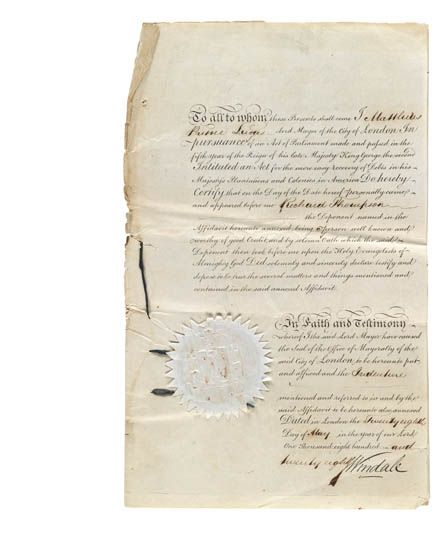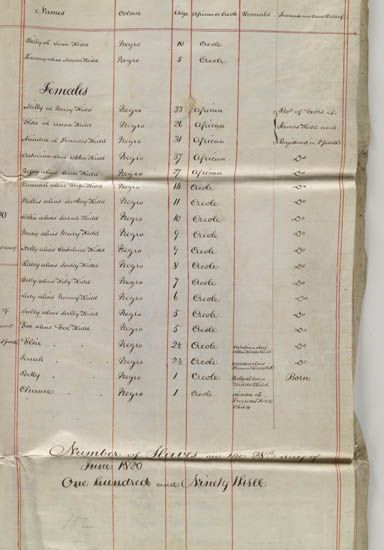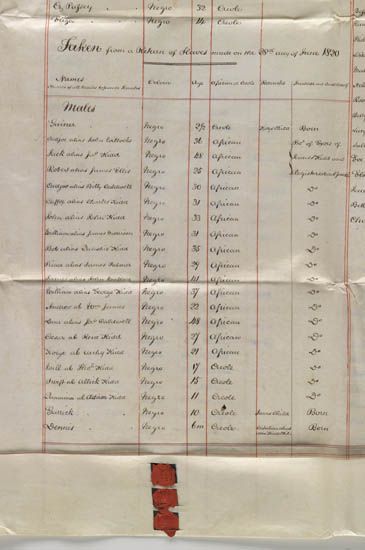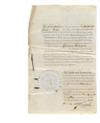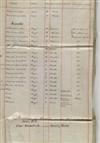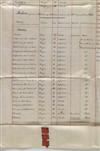Sale 2271 - Lot 16
Price Realized: $ 2,800
Price Realized: $ 3,360
?Final Price Realized includes Buyer’s Premium added to Hammer Price
Estimate: $ 4,000 - $ 6,000
194 SLAVES WITH FAMILY RELATIONSHIPS (SLAVERY AND ABOLITION.) JAMAICA. Demise of the Friendship Plantation of the Island of Jamaica for the Term on One Thousand years upon Trust for Securing Debts as within. Manuscript indenture, written out on five sheets of vellum. 23x30 inches, on rectos only, folded and attached at the lower margins with seven red wax seals over green silk ribbons, two of which are signed "George Reid" and "Roger Kynaston." Two leaves meticulously list the names, ages, skin color and race [Negro, Mulatto, or Sambo] of 194 slaves, with remarks (typically the name of the parent). Borders ruled in red, scalloped edge at the head of the first leaf. "This Indenture" at the head of the first leaf, illuminated and decorated with law stationer's label of "Edwards & Evison, Stationers, Temple, London." Creases where folded, forming nine sections; the outer docketing with some discoloration from age, otherwise bright and fresh within. With a partially printed 4-page 8vo affidavit, accomplished by hand, attached with silk ribbon, attesting to the authenticity of all signatures, signed by the Lord Mayor of London with his seal. should be seen London, 1823
Additional Details
(contains a listing of 194 slaves, with their racial characteristics as well as their somewhat complex family relationships meticulously detailed. The slaves are identified with their name, sometimes African, but more often a Western name like "Caesar" or "Becky." The next column gives their color (all are identified as "negro") then race, i.e, African or Creole (born on the island). There follows a "Remarks" column where a parent is sometimes given. i.e.: "Kitty. Negro. Creole. 27, (daughter of) Ebo Bess." Ebo, or "Ibo" is a large tribal group from Nigeria.
The overall list begins with the names of forty-eight slaves, listed as above. However there follows a sub-section of the "increase" (the children) of various slaves, most bearing the surname Kidd, presumably from an earlier owner. There are 21 males and 19 females all bearing Kidd's name, ranging in age from six months to 48 years. The list then continues with the remainder of the 194 slaves.
The Friendship Plantation, like many on the island was family owned. However, given the nature of the sugar and rum business, complex partnerships often took place, some through marriage--some through debt. George Reid, a principal in the West India mercantile house of George Reid and Company, acquired the plantation, entering into partnership with Roger Kynaston in 1815. Reid and Kynaston each had married a daughter of Sir Charles Oakley. Reid owned Friendship and Bunkers Hill estates. The extended Reid family also owned several other plantations in the area. This instrument lists all the debts to be paid from the estate, and all property to be taken into account: "all messuages (dwelling houses), negro houses, hospitals, warehouses, storehouses, boiling houses, curing houses, refining houses, stills, still houses. . . also all and singular the negro and other slaves. . .belonging to the said plantation and lands." A detailed account of history of the ownership and any legal actions regarding Friendship Plantation accompanies this document.
The overall list begins with the names of forty-eight slaves, listed as above. However there follows a sub-section of the "increase" (the children) of various slaves, most bearing the surname Kidd, presumably from an earlier owner. There are 21 males and 19 females all bearing Kidd's name, ranging in age from six months to 48 years. The list then continues with the remainder of the 194 slaves.
The Friendship Plantation, like many on the island was family owned. However, given the nature of the sugar and rum business, complex partnerships often took place, some through marriage--some through debt. George Reid, a principal in the West India mercantile house of George Reid and Company, acquired the plantation, entering into partnership with Roger Kynaston in 1815. Reid and Kynaston each had married a daughter of Sir Charles Oakley. Reid owned Friendship and Bunkers Hill estates. The extended Reid family also owned several other plantations in the area. This instrument lists all the debts to be paid from the estate, and all property to be taken into account: "all messuages (dwelling houses), negro houses, hospitals, warehouses, storehouses, boiling houses, curing houses, refining houses, stills, still houses. . . also all and singular the negro and other slaves. . .belonging to the said plantation and lands." A detailed account of history of the ownership and any legal actions regarding Friendship Plantation accompanies this document.
Exhibition Hours
Exhibition Hours
Aliquam vulputate ornare congue. Vestibulum maximus, libero in placerat faucibus, risus nisl molestie massa, ut maximus metus lectus vel lorem.



